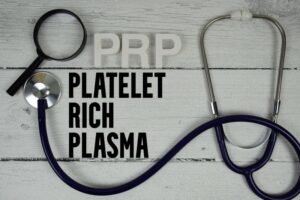Is PRP Right for You? Understanding Its Risks and Limitations
October 5, 2025

Platelet-rich plasma (PRP) therapy is a popular treatment. It is often used after surgeries and injuries to help patients heal faster and have a more comfortable recovery period. But what exactly is PRP therapy? What are its benefits, risks, and limitations? This blog post aims to help you have a balanced view of this regenerative medicine treatment.
PRP: The Basics
The concept of PRP is pretty easy to understand. Essentially, your doctor takes a bit of blood from you and then processes it in a centrifuge to separate it into different parts. The platelet-rich part of the blood is then placed back in your body at the site of damaged tissues. There, it can promote healing by releasing growth factors and attracting reparative cells to the area.
The Pros of PRP
PRP offers some pretty outstanding benefits:
- PRP therapy uses your own blood, which minimizes the risk of allergic reactions or disease transmission. In other words, it is a very safe treatment!
- PRP can significantly reduce pain and inflammation, thereby supporting a more comfortable recovery process.
- Treatment is minimally invasive, often performed in an outpatient setting with little downtime.
- PRP may help improve function and mobility in affected joints and tissues.
- There is growing evidence to support PRP’s effectiveness in treating conditions like osteoarthritis and sports injuries.
Risks and Limitations of PRP Therapy
PRP is amazing, but just like any treatment, it has some potential drawbacks:
- It is not effective for everyone. Research indicates that PRP is effective in about 60% of cases of knee osteoarthritis. Data about its success rate in other applications is not widely available.
- It is not FDA-approved for any specific condition. Therefore, many health insurance companies view it as investigative or experimental and will not cover it. Most patients must pay out-of-pocket for it.
- The process is ever-evolving. Questions about the ideal doses of PRP and the best ways to use it are still under investigation.
- It is usually supplemental. PRP can be used as a standalone treatment in some situations. However, it is usually most effective as part of a treatment plan that incorporates other therapies.
Would you like to learn more about the pros and cons of PRP therapy? A qualified provider can help you gain a balanced and well-rounded perspective on this treatment.
Meet the Practice
The Institute for Non-Surgical Orthopedics features a large team of experts who offer a broad range of services, including PRP therapy. Our goal is to help patients find pain relief and enjoy improved health and quality of life. If you would like to learn more about us and the services we provide, contact our Fort Lauderdale location at 954-563-2707.
No Comments
No comments yet.
RSS feed for comments on this post.
Sorry, the comment form is closed at this time.









